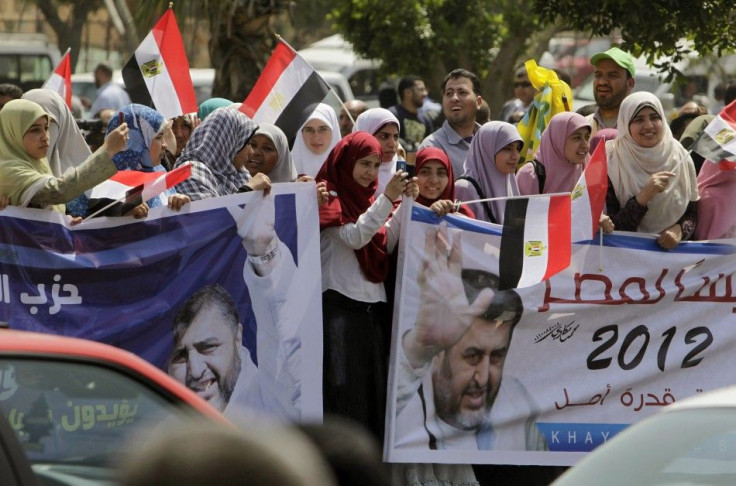'Appropriate And Right' To Host Egypt's Muslim Brotherhood: White House

The White House defended Thursday the Obama administration's meetings with a delegation from Egypt's Muslim Brotherhood, saying it needs to establish dialogue with the now-dominant Islamic party.
The Obama administration's overtures to the Brotherhood reflect the reconfigured contours of Middle East politics. During the years when Hosni Mubarak ruled Egypt as a steadfast American ally, the United States was deeply skeptical of the Brotherhood, which embraces a conservative Islamic vision and has close bonds with radical groups like Palestinian Hamas.
But Mubarak's ouster last February, and the Brotherhood's status as a key player in Egypt's fledgling democracy, have upended that dynamic. White House press secretary Jay Carney confirmed that mid-level officials had met with a Brotherhood delegation this week in Washington, and said that engaging with the group was the appropriate and right thing to do.
Carney confirmed the administration has broadened our engagement to new political actors in response to the political upheaval of the Arab Spring. He said the contact was not unprecedented, noting that prior administrations had met with Brotherhood members serving in Egypt's parliament.
The kind of engagement that we are participating in with Egypt and with its post-revolution leadership and with the emerging political actors on the scene is the right way to enhance our bilateral relationship, Carney said, adding that we will judge Egypt's political actors by how they act, not by their religious affiliation.
Egypt's first parliamentary elections since the fall of Mubarak have given the Brotherhood unprecedented political clout. Despite being formally banned under Mubarak, the Brotherhood remained Egypt's best-organized opposition force. Its size and sophistication allowed the Brotherhood's Freedom and Justice Party to win a plurality of seats in last year's election. The Brotherhood also said it would field a candidate in the presidential election next May.
Secretary of State Hillary Clinton said the administration had begun the outreach last June, explaining that it is in the interests of the United States to engage with all parties that are peaceful, and committed to non-violence, that intend to compete for the parliament and the presidency. The Brotherhood's electoral success bolstered the effort, according to the New York Times.
Moderate Stance
There doesn't seem to me to be any other way to do it, except to engage with the party that won the election, an anonymous administration official told the Times in January, adding, They've been very specific about conveying a moderate message -- on regional security and domestic issues, and economic issues, as well.
Members of the Muslim Brotherhood have tried to dispel concerns about the party's Islamist bent and its potential to become politically dominant, reassuring officials that it will respect the rights of women and religious minorities.
We represent a moderate, centrist Muslim viewpoint, Sondos Asem, a member of the delegation visiting the U.S., told the Washington Post on Tuesday. The priorities for us are mainly economic, political -- preserving the revolution ideals of social justice, education, security for the people.
The Obama administration is in a precarious position, forced to balance old alliances against the emerging new order in Egypt. Egypt's 1979 peace treaty with Israel has long been seen as a cornerstone of peace and stability in the region, and successive U.S. administrations buttressed that status quo by sending Egypt billions of dollars in aid every year.
But the ruling military council has effectively taken control of Egypt since Mubarak fell and has been accused of trying to stifle democracy. The Supreme Council of the Armed Forces has violently suppressed protests, imprisoned political opponents, and has been accused of seeking to enshrine permanent powers for itself in a yet-to-be-written constitution.
Billions in Aid
The United States threatened to suspend its annual aid package to Egypt earlier this year after Americans working for pro-democracy nonprofits were arrested and put on trial. The standoff plunged U.S.-Egyptian relations to their lowest point in years, and the Brotherhood sided with the Supreme Council of the Armed Forces. The United States chose not to halt the $1.3 billion in assistance after the accused Americans were permitted to leave, having paid millions of dollars in bail.
U.S. lawmakers calling for the aid to be withdrawn noted that Congress had passed new restrictions requiring that the Secretary of State certify the Egyptian government was supporting the transition to civilian government including holding free and fair elections; implementing policies to protect freedom of expression, association, and religion and due process of law. Clinton waived that requirement, drawing angry responses from some lawmakers.
I know Secretary Clinton wants the democratic transition in Egypt to succeed, but by waiving the conditions we send a contradictory message, Sen. Patrick Leahy, D-Vt., said at the time.
© Copyright IBTimes 2025. All rights reserved.





















